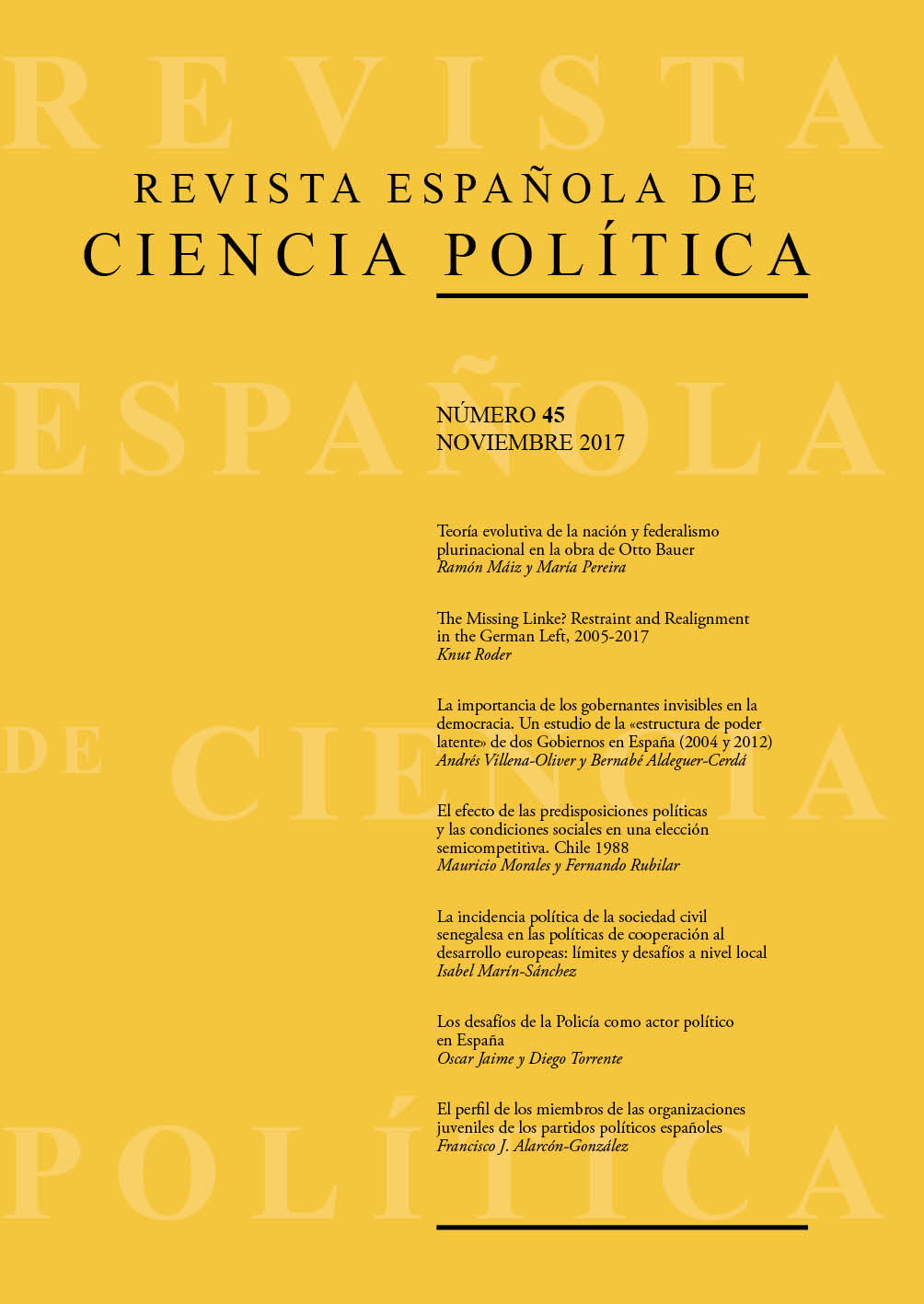The evolutionary theory of the nation and plurinational federalism in Otto Bauer’s oeuvre
DOI:
https://doi.org/10.21308/recp.45.01Keywords:
nation, national minorities, Multinational State, plurinational federalism, (territorial and non-territorial) autonomy.Abstract
This article systematically analyzes Otto Bauer’s concept of nation as a non-essential community and as an evolutionary process of political construction, that it is open and contingent as well as plural and contested. This innovative concept enabled him to overcome the nineteenth-century monist equation, underlying both the postulates of the national state (one State = one Nation) and its secular antagonist, the Principle of Nationalities (one Nation = one State). The pluralist and processual conception of nation enabled it, in turn, to postulate a normative proposal unthinkable from the classic assumptions of the theory of sovereignty, not only for the nation state, but also for sub-state nationalisms against the state: a democratic plurinational state bound to facilitate the coexistence of several nations in a plural scenario of mutual respect, interterritorial solidarity, cooperation and reciprocal cultural and linguistic enrichment. The institutional and cultural design that enlightens this new scenario is provided by federalism, but a reformulated format for it, namely the plurinational federalism, that is characterized by self-government and shared government, unity and diversity, and a balance between the territorial and personal principle, thought for recognition, material equality and respect between national majorities and minorities. The current relevance of accommodation designs based on ethnic and national pluralism, through mechanisms of territorial and non-territorial autonomy illustrates the fruitfulness of Bauer’s thought.Downloads
References
Abellán, Joaquín. 1997. Nación y nacionalismo en Alemania. Madrid: Tecnos.
Arzoz Santisteban, Xabier. 2015. «Karl Renner y la teoría de la autonomía nacional», en Karl Renner, Estado y Nación. El derecho de las naciones a la autodeterminación. Madrid: Tecnos.
Agnelli, Arduino. 1969. Questione nazionale e socialismo. Contributo allo studio del pensiero di K. Renner e O. Bauer Bolonia: Il Mulino.
Bauer, Otto. 1907. Die Nationalitätenfrage und die Sozialdemokratie. Viena: Ignaz Brand.
Bauer, Otto. 1912. «Die Bedingungen der nationalen Assimilation», en Werkausgabe. Viena: Europaverlag.
Bauer, Otto. 1975-1980. Werkausgabe, 9 vols. Viena: Europaverlag.
Blum, Mark. E. y William Smaldone. 2015. Austro-Marxism. The ideology of unity. Austro-Marxist theory and strategy. Boston: Brill.
Cacciari, Massimo. 1980. Dallo Steinhoff. Prospettive viennesi del primo Novecento. Milán: Adelphi.
Clair, Jean (ed.). 1983. Apocalypse Joyeuse. París: Centre Pompidou.
Connor, Walker. 1984. The National question in Marxist-Leninist Theory and Strategy Princeton: Princeton University Press.
Czerwinska-Schupp, Ewa. 2005. Otto Bauer: Studien zur social-politischen Philosophie. Frankfurt: Peter Lang Verlag.
Erk, Jan. 2015. «Non-Territorial Millets in Ottoman History», en Tove H. Malloy y Francesco Palermo (eds.), Minority accommodation through territorial and non-territorial autonomy. Oxford: Oxford University Press.
García-Pelayo, Manuel. 1979. La teoría de la nación de Otto Bauer. Madrid: Fundación Pablo Iglesias.
Hanisch, Ernst. 2011. Der grosse Illusionist. Otto Bauer 1881-1938. Viena: Böhlau Verlag.
Haupt, George, Michel Lowy y Claudie Weill. 1974. Les marxistes et la question nationale 1848-1914. París: Maspero.
Herod, Charles C. 1976. The nation in the history of marxian thought. La Haya: Martinus Nijhoff.
Janik, Allan y Stephen E. Toulmin. 1973. Wittgenstein´s Vienna. Nueva York: Simon and Schuster.
Kautski, Karl J. y Eduard Bernstein. 1978. La Segunda Internacional y el problema nacional y colonial. México: Cuadernos de Pasado y Presente.
Latraverse, Françoise y Walter Moser (eds.). 1988. Vienne au tournant du siècle. París: Albin Michel.
Leisse, Olaf. 2012. Der Untergang des östrreichischen Imperiums. Otto Bauer und die Nationalitätenfrage in der Habsburger Monarchie. Marburgo: Tectum.
Luxemburg, Rosa. 1979. La cuestión nacional y la autonomía. México: Cuadernos Pasado y Presente.
Magris, Claudio. 1963. Il Mito absburgico nella letteratura austriaca moderna. Turín: Einaudi.
Máiz, Ramón. 2010. «Karl Marx. De la superación del Estado a la dictadura del proletariado», en Fernando Vallespín (ed.), Historia de la teoría política. 4. Madrid: Alianza Editorial.
Máiz, Ramón. 2012. The Inner Frontier. The place of nation in the political theory of democracy and federalism. Frankfurt: Peter Lang Verlag.
Malloy, Tove H. y Francesco Palermo (eds.). 2015. Minority accommodation through territorial and non-territorial autonomy. Oxford: Oxford University Press.
Malloy, Tove H., Alexander Osipov y Bálazs Vizi (eds.). 2015. Managing diversity through non-territorial autonomy. Oxford: Oxford University Press.
Mann, Michael. 2005. The dark side of democracy: Explaining ethnic cleansing. Cambridge: CUP.
Mann, Thomas. 1983. Betrachtungen eines Unpolitischen. Frankfurt: Fischer.
MEW. 1961. Marx-Engels-Werke. Vol. IV. Berlin: Dietz.
Marramao, Giacomo. 1977. Austromerxismo e socialismo de sinistra fra le due guerre. Milán: La Pietra.
Meinecke, Friedrich. 1963. Weltbürgertum un Nationalstaat. Munich: Oldenburg.
Molnár, Miklós y André Reszler (eds.). 1989. Le Génie de L’Autriche-Hongrie. Paris: PUF.
Mommsen, Hans. 1963. Die Sozialdemokratie und die Nationalitätenfrage im habsburgischen Vielvölkerstaat. Vienna: Europa Vertag
Mommsen, Hans. 1979. Arbeitbewegung ubd nationale Fraghe. Gotinga: Vandenhoeck y Ruprecht.
Nagel, Klaus (ed.). 2016. Otto Bauer, Karl Renner. Escrits sobre nació i federalisme. Barcelona: IEA.
Nimni, Ephraim (ed.). 2005. National Cultural Autonomy and its Contemporary Critics. Londres: Routledge.
Nimni, Ephraim. 2015. «Minorities and the limits of liberal democracy. Democracy and non-territorial autonomy», en Tove H. Malloy y Francesco Palermo (eds.), Minority accommodation through territorial and non-territorial autonomy. Oxford: Oxford University Press.
Nimni, Ephraim, Alexander Osipov y David J. Smith (eds.). 2013. The challenge of non-territorial autonomy. Oxford: Peter Lang.
Renner, Karl. 1994. Schriften (hrgb. Anton Pelinka). Viena: Residenz.
Renner, K. 1994 [1899]. «Staat und Nation», en Schriften. Viena: Residenz.
Renner, Karl. 2015. Estado y nación. El derecho de las naciones a la autodeterminación. Madrid: Tecnos.
Schmitter, Philippe C. 1994. «Conceptual travels of Transitologists and Consolidologists», Slavic Review, 53 (1): 173-185.
Schorske, Carl E. 1979. Fin-de-siècle Vienna: Politics and culture. New York: Knopf.
Downloads
Published
How to Cite
Issue
Section
License
Copyright (c) 2017 Ramón Máiz; María Pereira

This work is licensed under a Creative Commons Attribution-NonCommercial-NoDerivatives 4.0 International License.






